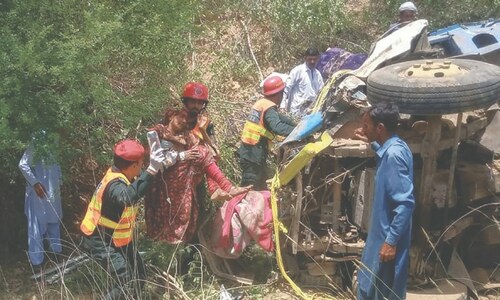ISLAMABAD, Feb 7: Pakistan on Monday said the so-called international nuclear black market network in the country had been dismantled and neutralized and denied US media reports about the 16 cylinders of uranium hexafluoride gas missing from the Khan Research Laboratories (KRL).
Speaking at his weekly press briefing here, Foreign Office spokesman Masood Khan said the report claiming that the network was still functioning, was incorrect because international black market, as far as Pakistan was concerned, had been dismantled and neutralized.
Referring to claims made in the US media reports that the evidence against the A.Q. Khan network was far more (in its scope) than admitted by the Pakistani authorities, the spokesman said that Dr Khan had been removed and put in house arrest about a couple of years ago.
He said the latest media report was entirely speculative and a rehash of some of the previous speculative reports on the subject. It was without any substance and merited no official rebuttal. However, he reiterated that Pakistan's record and inventories had been checked by the authorities concerned and found to be clean and complete with no gaps.
An American magazine in its latest edition has highlighted alleged dealings of the defunct Khan network with Iran which is currently engaged in a furious row with the United States over its nuclear programme.
The spokesman said that Pakistan had conducted a thorough investigation into the Khan network, adding that the authorities had cleared up this business and even kept the international community informed about the results of the investigations.
He emphasised that Pakistan was still taking steps to prevent further nuclear proliferation and was ready to look into the fresh evidence if brought to its attention. He urged the international community to join in such investigations against similar activities elsewhere, since several other countries were known to have been involved in such practices.
The spokesman said Pakistan believed that it was the collective responsibility of other countries to eliminate the nuclear black market and place the results of their investigations before the international anti-nuclear proliferation authorities and share information with the international community.
When asked about the impact of the postponement of the Saarc summit in Dhaka due to the Indian prime minister's refusal to attend it, the spokesman said the Indian decision was anomalous since it contradicted its own previous position that Saarc should not interfere in bilateral or internal issues of member states.
He, however, said that Islamabad would continue to make efforts for the rescheduling of the Saarc summit in the interest of regional cooperation and member countries.
The spokesman said the summit postponement and a likely date for the visit by Indian Prime Minister Manmohan Singh to Pakistan would be discussed with Indian Foreign Minister Natwar Singh during his forthcoming visit to Islamabad.
The foreign ministers of the two countries would also discuss further steps to expedite the Pakistan-India composite dialogue process, he added.
Replying to another question, the spokesman said that diversion of the Kishanganga waters in occupied Kashmir by India was another issue on which Pakistan had reservations and along with the Baglihar dam issue was a case which fell under the Indus Water Treaty and needed to be resolved if necessary by the World Bank.
Asked about the controversy between India and Pakistan on the latter's effort to ensure balance in conventional arms, the spokesman said it was Islamabad's sincere desire that the imbalance in conventional arms should not only be reduced but ultimately eliminated in the interest of regional peace and stability.
He expressed satisfaction that the US defence team which recently visited Pakistan was sensitized to the needs of the country's conventional arms in the face of growing Indian military posture in South Asia.
Asked whether it was a condition from Pakistan that if no progress on the Kashmir issue was made it would not proceed further on the dialogue process, Mr Khan said though it was not a condition from the Pakistan's side, it made sense that if no progress was made on the key question of Kashmir, talks on mere confidence-building measures would lead to nowhere and create difficulties.
In reply to another question, the spokesman said that Islamabad would welcome establishment of a counter-terrorism centre as proposed at an international conference in Saudi Arabia to devise a strategic operational plan and establishment of an international centre to implement an anti-terrorist plan.
He, however, said that it was not possible for a conference like the Riyadh meeting to define terrorism and the issue should be left to the United Nations to come up with a definition.















































Dear visitor, the comments section is undergoing an overhaul and will return soon.